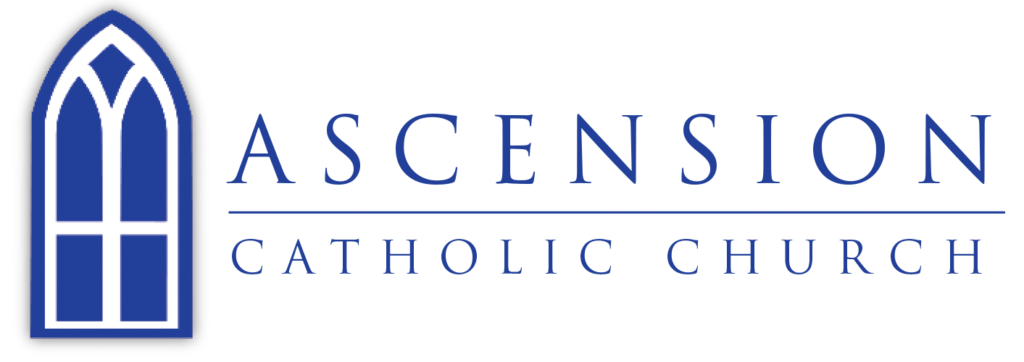Mass Times
Mass Times
Sunday (All Masses in the Main Church)
7:00 AM, 9:15 AM, 10:45 AM, 12:15 PM, and 5:30 PM
Monday - Friday
6:30 AM
12 Noon (Main Church)
Saturday (Main Church)
5:00 PM Sunday Vigil Mass
Six of our seven weekend Masses offer beautiful music, while the 7am on Sunday is a more quiet celebration of the Eucharist. Our choir sings at the 9:15 AM Sunday Mass, and the 10:45 AM and 5:30 PM Sunday Masses are led by our Youth Ministry Musician.
The Sunday 10:45 AM Mass has Children's Liturgy of the Word.
Every First Friday the Alliance of the Two Hearts sponsor a Reparation Vigil in the Main Church, which includes an evening Mass and a midnight Mass. Between the two Masses our Lord is adored, Confession is available, and many devotional prayers are prayed, contact the office for more information.
Check out our Guide to the Mass
See our Mass Schedule for Holy Days of Obligation.
All Masses are in the Main Church.
We also livestream Mass everyday on the Ascension Website, YouTube and Facebook.
Livestream Schedule:
Monday-Friday, 12 noon masses
Sunday 9:15am
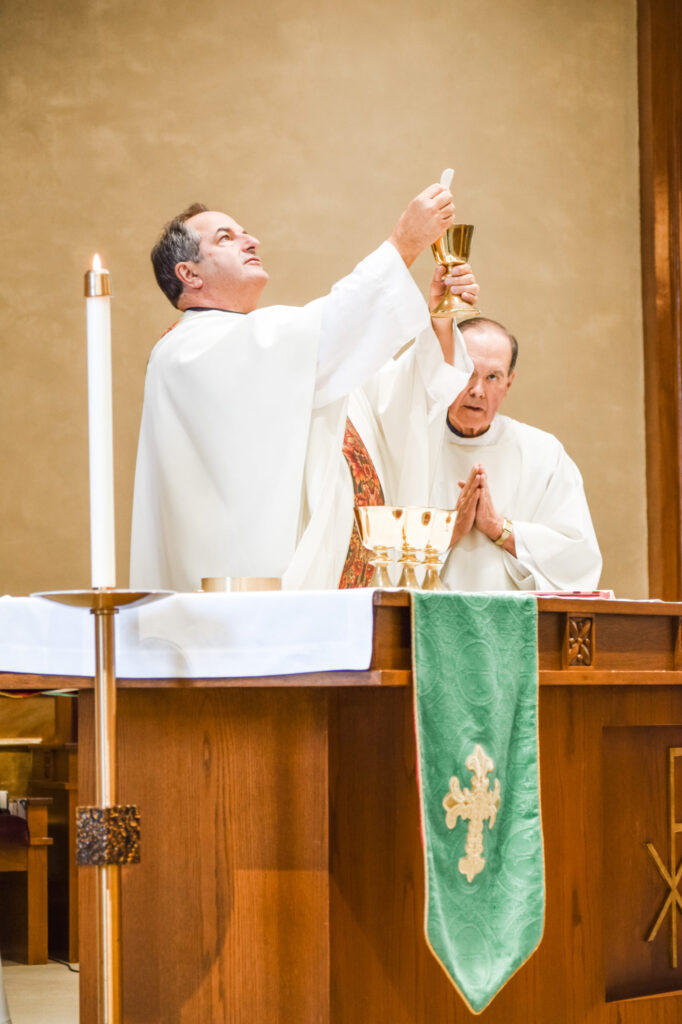
Guide to Mass
The Mass, or also known as the Holy Sacrifice of the Mass, is the most important, central, and sacred act of worship in Catholicism. This is because the Holy Eucharist is “the source and summit of Christian Life” (Lumen Gentium; 1964). As Catholics, we believe that during the Mass, the bread and wine are changed into the Body and Blood of Christ, called the Eucharist, even though the appearances of bread and wine remain. We firmly maintain that Jesus Christ is really, truly, and substantially present in the Eucharist. It is not simply a sign or symbol, but really Jesus Christ. To help prepare us for encountering Jesus Christ in the Eucharist, we come to Him through Sacred Scripture. Praying with the scripture readings for Mass in advance can further enhance our encounter with Christ at Mass. Click here for the daily Mass readings.
Participation at Mass
During Mass the congregation participates by singing, praying, speaking, sitting, kneeling and so on. The priest is the leader of the prayers during Mass, but the prayers of the people join his.
The Mass has four parts:
In the Liturgy of the Word, we listen attentively to multiple passages read from Sacred Scripture, and then the priest or deacon preaches about the readings to help us understand them, apply them to our lives, and prepare us to meet Jesus in the Eucharist. The Liturgy of the Eucharist includes the Eucharistic prayer. During this prayer, Jesus Christ, through His priest, consecrates the bread and wine into His Body and Blood and offers Himself to God the Father. The congregation joins Christ in this prayer by uniting Jesus Christ alive within their souls, along with themselves, to the priest, and through the priest, to Jesus Christ, and they offer all of it to God the Father.
Every person should be disposed to, cooperative with, and willing to accept the supernatural divine graces being bestowed at the Mass. Knowing the responses and postures during Mass can help us better participate and be disposed to receive God's grace. Understanding the Mass can help us be well disposed, too. So, let us be as well-disposed as we can be as we celebrate Mass by learning more about it.
Below is a brochure for the Responses and Postures for the Catholic Mass which can help you know the responses and when to sit, stand, and kneel.
Introductory Rights
We prepare ourselves to enter into the sacred mystery of the Most Holy Sacrifice of the Mass. These rites include the Procession, Sign of the Cross, Penitential Act, Kyrie, Gloria, and Collect.
The Liturgy of the Word
After the Collect we sit to meditate on a series of Biblical readings. Although the words we hear have been fixed in writing, we remember that they are the inspired Word of God and are truly alive (Heb 4:12). Through these readings, God intends to speak something new to us at this moment. We recall that the Word of God is not a book or a doctrine, it is a Person, Jesus Christ. These readings include a First Reading, typically from the Old Testament (except during Easter), the Responsorial Psalm, the Second Reading, which is always from the New Testament, and a passage from one of the four Gospels.
The homily is meant to explain or reveal the meaning within the Sacred Scriptures and how they apply to us today. Our response to the readings and the homily, is faith which is expressed on Sundays and Solemnities with the Creed. That faith is then used along with hope and charity as we intercede for ourselves and others in the Prayers of the Faithful.
The Introductory Rites and the Liturgy of the Word, prepare us for the climax found in the Liturgy of the Eucharist.
The Liturgy of the Eucharist
Jesus’ sacrifice of Himself on the Cross is made present to us again by the priest who does what Jesus did at the Last Supper.
Within the Liturgy of the Eucharist there are many parts with many subparts. In the Preparation of the Gifts, the altar is prepared and the gifts of bread and wine are presented. These gifts represent the offering of our lives, so we should bring our joys, sorrows, successes, and struggles to the altar. While we desire to make ourselves into a perfect offering to the Father, we can never accomplish this task alone, but we can offer ourselves worthily in union with the perfect offering of Jesus on the Cross.
The Eucharistic Prayer begins with a dialogue. “The Lord be with you … and with your spirit…”and concludes with the Great Amen where the community expresses its assent of this prayer. Through this prayer, offered by the priest for the people, Christ becomes present. Simple bread and wine become the Body, Blood, Soul and Divinity of Jesus Christ. It is the highest prayer of the Church. As such, it is this part of the Mass that should have our greatest attention. The Eucharistic Prayer includes the Preface, the Sanctus, the Epiclesis, the Consecration, the Memorial Acclamation, Offering, Intercessions, Doxology, and the Great Amen.
We further prepare ourselves to receive Him in Holy Communion in the Communion Rite. This rite includes: The Lord’s Prayer, the Rite of Peace, the Agnus Dei (Lamb of God), and Holy Communion. Since we believe that Jesus is really and truly present in the Eucharist and not everyone shares that belief with us, we respect their beliefs by asking them to refrain from receiving Holy Communion because the very act of receiving communion means that the beliefs of the individual are the same as the community where they receive communion. In other words, to receive Holy Communion means that the person believes in all the teachings of the Catholic Church including the teaching that Jesus Christ is truly present in the Eucharist.
Concluding Rites
The priest greets the people, blesses them, and then the priest (or deacon) dismisses the people. At the end of Holy Mass, we give thanks and praise to Almighty God and we go out to bring this goodness to others through the conduct of holy lives.
Holy Days of Obligation Mass Schedule
6:30am, 8am, 12 noon, 5pm, & 7pm in the Main Church
- January 1: The Solemnity of Mary, the Mother of God
- August 15: Assumption of Mary into heaven
- November 1: All Saints' Day
- December 8: The Solemnity of the Immaculate Conception
- December 25: Christmas, the Nativity of Our Lord
Note: Whenever January 1, the Solemnity of Mary, Mother of God; August 15, the Solemnity of the Assumption; November 1, the Solemnity of All Saints; or December 8, The Solemnity of the Immaculate Conception, falls on a Saturday or on a Monday, the obligation to attend Mass is removed.
Children's Liturgy
Children's Liturgy is offered at both the 9:15am and 10:45 am Masses on most Sundays (typically not Christmas or Easter). Children ages preschool to 2nd grade (before First Communion) are invited to come together for the Children's Liturgy of the Word immediately following the priest's welcome. The children go to a room in the back of the church with adult volunteers to participate in the liturgy at a child's level and they return during the offertory.
No prior sign up is needed. We hope your family will join us!
In addition to Children's Liturgy of the Word, we also offer Little Lambs Sunday School.
Little Lambs is a preschool age Sunday School program that introduces little ones to the teachings of our faith with age appropriate activities that enrich their understanding and love of the Catholic Faith. The session for Sunday School is 10:30 – 11:45am.
This allows for parents to attend the 10:45am Mass at the same time. **Students must be potty trained!
We meet in the Pre-K classroom in the Ascension school building.
Please Contact Kathy Nickel, Little Lambs Director, at (636)391-8624 or knickel@ascensionchesterfield.org
Confession
Confessions are available in the Main Church. See our regular schedule below.
Monday-Saturday
7:30 AM - 7:50 AM
Saturday Afternoon
4:00 PM - 4:45 PM
Anytime: Make an Appointment by emailing one of the priests
Call the Parish office: 636-532-3304
It's never too late to go back to the Sacrament of Confession. Click here for our guide on How to Go to Confession.
Confession is a sacrament in which the sins we committed after baptism are confessed to God through His priests. Jesus Christ forgives the person seeking forgiveness through His priests when the priest acting in the person of Christ says the words, "...I absolve you from your sins in the name of the Father, and of the Son, and of the Holy Spirit." This sacrament is also called Reconciliation and Penance.
How to go to Confession
The basic requirement for a good Confession is to have the intention of returning to God like the “prodigal son” and to acknowledge our sins with the true sorrow before the priest.
Sin in My Life
Modern society has lost a sense of sin. As a Catholic follower of Christ, I must make an effort to recognize sin in my daily actions, words and omissions. The Gospels show how important is the forgiveness of our sins. Lives of saints prove that the person who grows in holiness has a stronger sense of sin, sorrow for sins, and a need for the Sacrament of Reconciliation or Confession.
The Differences in Sins
As a result of Original Sin, human nature is weakened. Baptism, by imparting the life of Christ’s grace, takes away Original Sin, and turns us back toward God. The consequences of this weakness and the inclination to evil persist, and we often commit personal or actual sin. Actual sin is sin which people commit. There are two kinds of actual sin, mortal and venial. Mortal sin is a deadly offense against God, so horrible that it destroys the life of grace in the soul. Three simultaneous conditions must be fulfilled for a mortal sin: 1) the act must be something very serious; 2) the person must have sufficient understanding of what is being done; 3) the person must have sufficient freedom of the will.
Remember
If you need help—especially if you have been away for some time—simply ask the priest and he will help you by “walking” you through the steps to make a good confession.
Before Confession
Be truly sorry for your sins. The essential act of Penance, on the part of the penitent, is contrition, a clear and decisive rejection of the sin committed, together with a resolution not to commit it again, out of the love one has for God and which is reborn with repentance. The resolution to avoid committing these sins in the future (amendment) is a sure sign that your sorrow is genuine and authentic. This does not mean that a promise never to fall again into sin is necessary. A resolution to try to avoid the near occasions of sin suffices for true repentance. God’s grace in cooperation with the intention to rectify your life will give you the strength to resist and overcome temptation in the future.
Examination of Conscience
Before going to Confession you should make a review of mortal and venial sins since your last sacramental confession, and should express sorrow for sins, hatred for sins and a firm resolution not to sin again. A helpful pattern for examination of conscience is to review the Commandments of God and the Precepts of the Church Click here for an examination of conscience.
During Confession
After examining your conscience and telling God of your sorrow, go into the confessional. You may kneel at the screen or sit to talk face-to-face with the priest.
Begin your confession with the sign of the cross, “In the name of the Father and of the Son and of the Holy Spirit. My last confession was ____ weeks (months, years) ago.” The priest may, but usually does not, read a passage from the Holy Scripture.
Say the sins that you remember. Start with the one(s) that is most difficult to say. (In order to make a good confession the faithful must confess all mortal sins, according to kind and number.)
After confessing all the sins you remember since your last good confession you may conclude by saying, “I am sorry for these and all the sins in my past life.”
Listen to the words of the priest. He will assign you some penance. Doing the penance will diminish the temporal punishment due to sins already forgiven.
When invited, express some prayer of sorrow or Act of Contrition such as:
Act of Contrition (Traditional)
O my God, I am heartily sorry for having offended You, and I detest all my sins because of Your just punishments, but most of all because they offend You, my God, who art all good and deserving of all my love. I firmly resolve with the help of Your grace to sin no more and to avoid the near occasion of sin. Amen.
or
An Act of Contrition (Alternate Form)
O my God, I am heartily sorry for having offended you and I detest all my sins, because I dread the loss of heaven and the pains of hell. But most of all because I have offended You, my God, who are all good and deserving of all my love. I firmly resolve with the help of Your grace, to confess my sins, to do penance and to amend my life. Amen.
or
Act of Contrition (Used by our students)
My God, I am sorry for my sins with all my heart. In choosing to do wrong and failing to do good, I have sinned against You whom I should love above all things. I firmly intend, with Your help, to do penance, to sin no more, and to avoid whatever leads me to sin. Our Savior Jesus Christ suffered and died for us. In His name, my God, have mercy. Amen.
At the End of Confession
Listen to the words of absolution, the sacramental forgiveness of the Church through the ordained priest. As you listen to the words of forgiveness you may make the sign of the cross with the priest. If he closes by saying, “Give thanks to the Lord for He is good,” answer, “For His mercy endures forever.”
After Confession
Give thanks to God for forgiving you again. If you recall some serious sin you forgot to tell, rest assured that it has been forgiven with the others, but be sure to confess it in your next Confession.
Do Your Assigned Penance
Resolve to return to the Sacrament of Reconciliation often. We Catholics are fortunate to have the Sacrament of Reconciliation. It is the ordinary way for us to have our sins forgiven. This sacrament is a powerful help to get rid of our weaknesses, grow in holiness, and lead a balanced and virtuous life.
Eucharistic Adoration
Here at Ascension, we have Adoration on Tuesdays and Thursdays in the Little Church, beginning at 7:00 AM and concluding with Benediction at 7:00 PM. We would love for you to join us!
Although the Eucharist maintains the appearance of bread, we believe that once consecrated at Mass, what once was bread is now the Body of Christ, that is Jesus Christ Himself. All are invite to come and pray to our Lord Jesus Christ in our Little Church.
By Adoration, we mean adoring God, particularly God the Son, Jesus Christ, who is truly present in the Most Holy Eucharist. The Eucharist is displayed in a sacred vessel called the Monstrance so that our Lord can be adored by the faithful. To adore God is to acknowledge him as God, as the Creator and Savior, the Lord and Master of everything that exists, as infinite and merciful Love.
In addition these times, The Little Church is open 24/7 for people to come and pray to Jesus who is always present in the tabernacle where the Eucharist is kept.
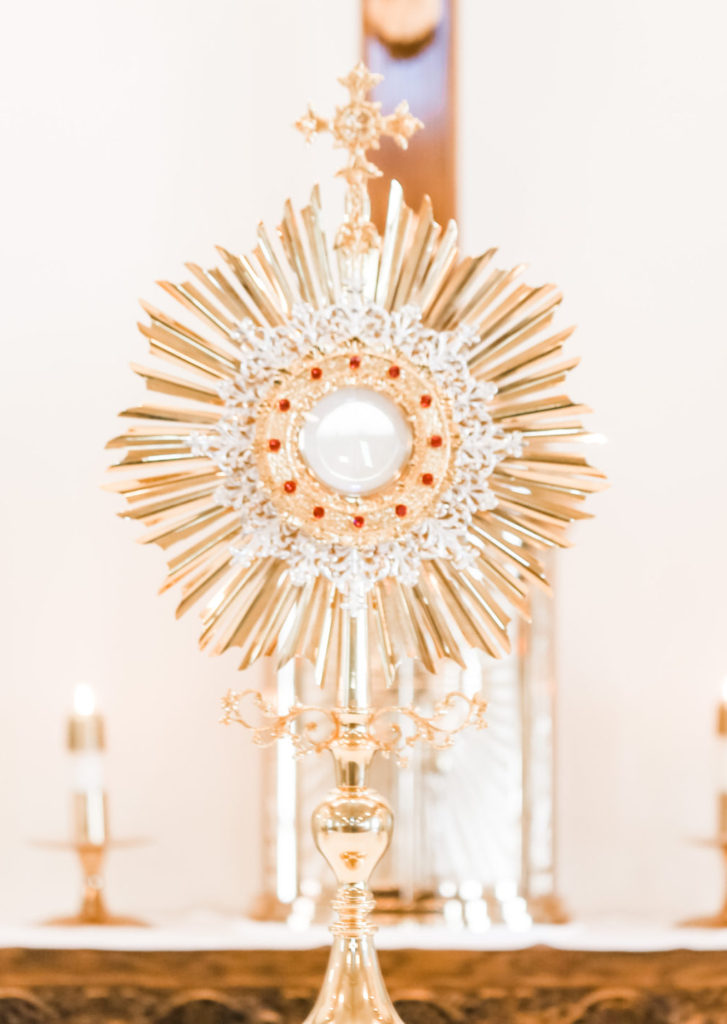
What is Adoration?
"Adoration is the first attitude of man acknowledging that he is a creature before his Creator. It exalts the greatness of the Lord who made us and the almighty power of the Savior who sets us free from evil. Adoration is homage of the spirit to the "King of Glory," respectful silence in the presence of the "ever greater" God. Adoration of the thrice-holy and sovereign God of love blends with humility and gives assurance to our supplications." - The Catechism of the Catholic Church, no. 2628
Eucharistic Adoration is the adoration of Jesus Christ present in the Most Holy Eucharist. Although the Eucharist maintains the appearance of bread, we believe that once consecrated at Mass, what once was bread is now the Body of Christ, that is Jesus Christ Himself is really present, Body, Blood, Soul, and Divinity. Jesus Christ is God the Son and we adore Him as God present in the Eucharist. The Eucharist is displayed in a special holder, called a monstrance, and people come to pray to, adore, and worship Jesus.
You can read about one young woman's experience in Adoration and the insights she had by going to her blog. Click here.
If you would like to bring a guide with you, then you can use the downloadable and printable brochure on the Adoration of the Adoration Prayer Card
Click here to learn more about the Real Presence and Adoration
Click here for a link to the Archdiocesan Eucharistic Adoration website
What do people do at Adoration?
There is no particular set of prayers for Adoration. We can come and pray however we best connect with the Lord. Some common ways are to pray with Sacred Scripture, pray the Rosary, or just spend some time with Jesus.
One suggestion by the late John Joseph Cardinal Carberry of St. Louis is to remember the acronym A.C.T.S.:
Adoration - We acknowledge God for who He is, and who we are in relationship to Him. Adoring Him for His great majesty, and meditating on Him as Love, Goodness, Truth, Beauty, etc.
Contrition (Sorrow) - We should examine ourselves and be contrite for our faults, failings, sins, and weaknesses. It is good to recall and present to God our these things because the more often we recognize them and present them to God, the easier it would be to confess them to Him in the Sacrament of Confession, and the easier it would be to overcome them when they are so frequently identified.
Thanksgiving - We are reminded to thank God for the many blessings and gifts we have received from Him, both the natural and supernatural. We should be grateful for the grace of salvation won for us by the Passion, Death, and Resurrection of Jesus Christ. We can and should also thank Him for blessings in our everyday life such as a beautiful day, an unexpected compliment, or for encountering Him in daily life.
Supplication (Petitions) - We are told to ask and we shall receive, to seek and we will find, to knock and the door will be open to us. We should pray for the things we need and for our own growth in holiness. When we ask God for things that He wants to give us, how could He refuse? We can also intercede for others, asking God to take care of those in need
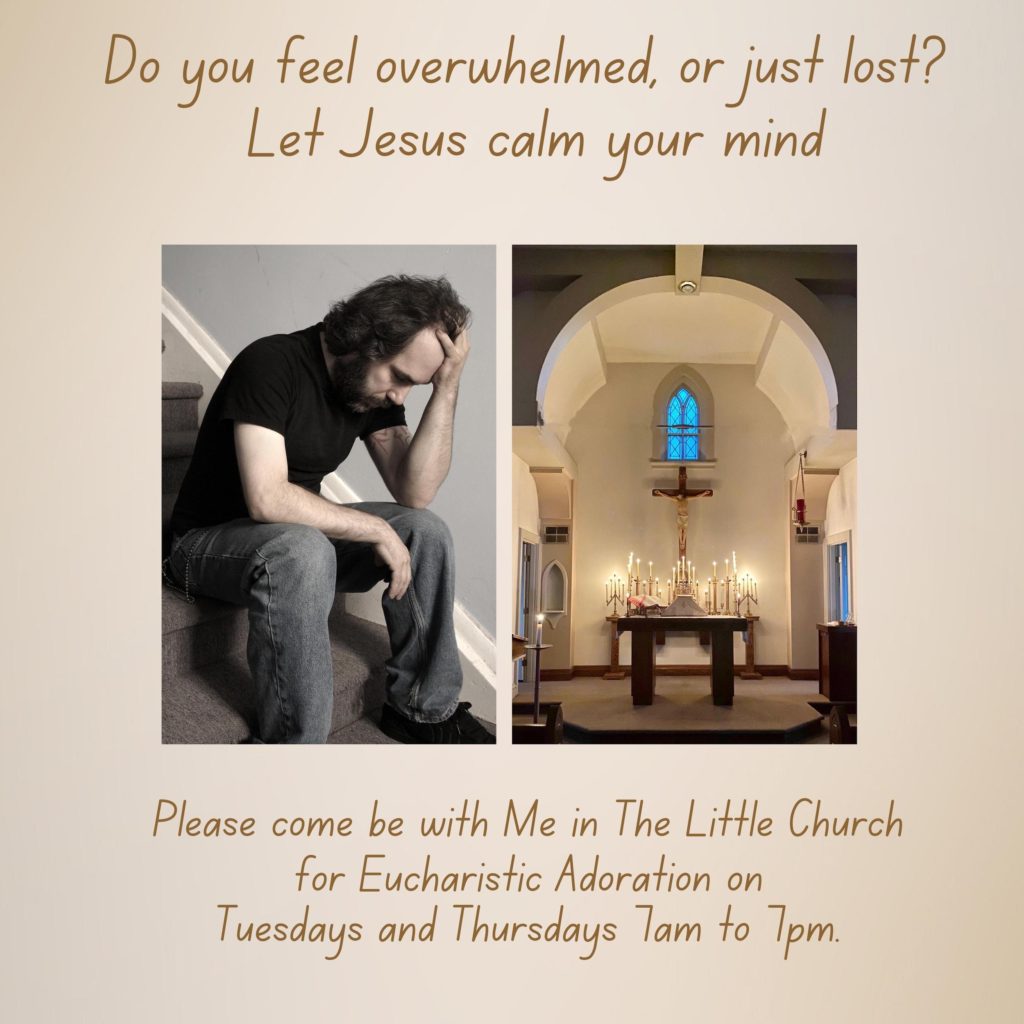
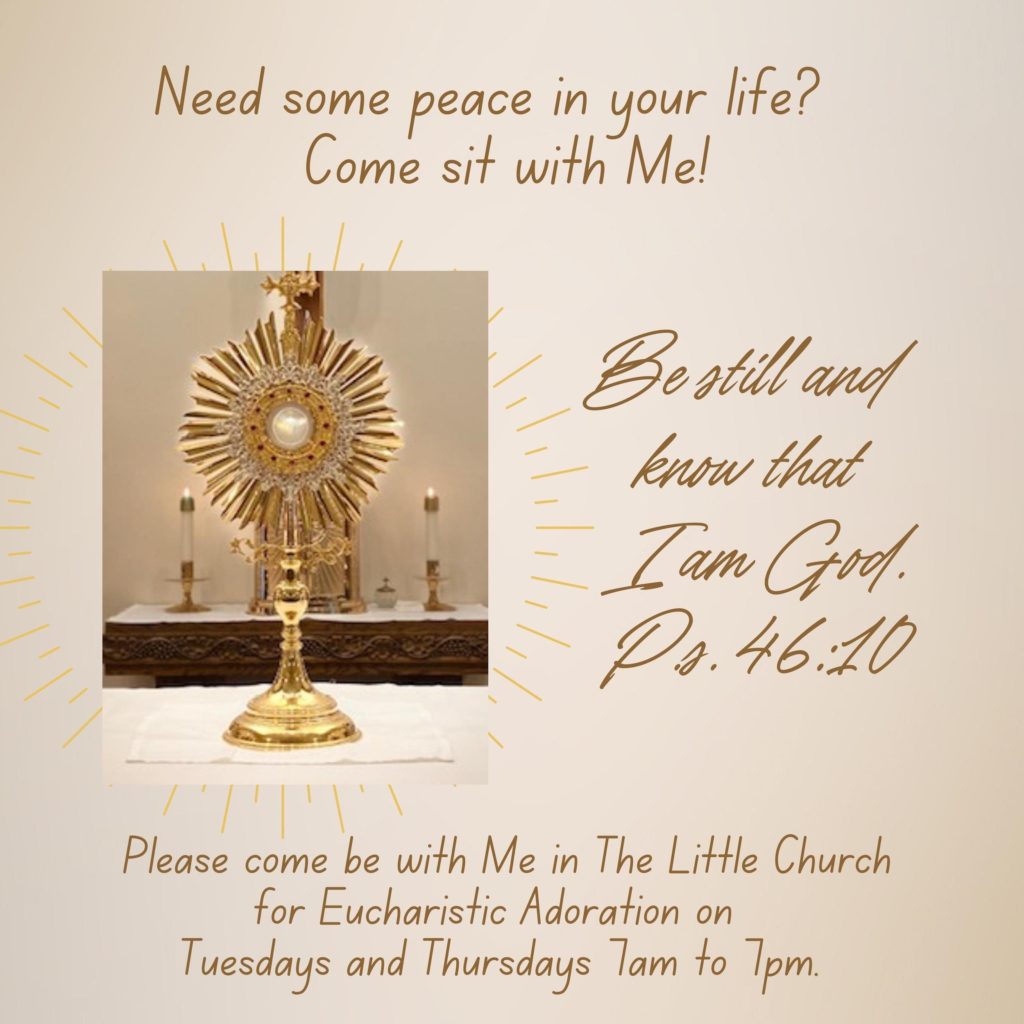
Devotions
The Rosary
The Rosary is a scripture based prayer that recalls important events or mysteries in the life of Jesus Christ. During the prayer we are calling upon Mary to help us to better understand the life of her Son. We also pray the Rosary to honor and unite ourselves with Jesus and Mary, and to give praise to our Triune God.
The beads of the Rosary are divided into five decades and each decade represents an event (or mystery) from the life of Jesus Christ. These five events are grouped into a set of Mysteries. It is recommended that we pray the Rosary every day, and so, each day of the week is assigned a set of mysteries to pray for that day. Pope Saint John Paul II recommended that we pray the Joyful mysteries on Monday and Saturday, the Luminous on Thursday, the Sorrowful on Tuesday and Friday, and the Glorious on Wednesday and Sunday.
Ascension Rosary Schedule:
Monday - Saturday
7:30 AM in the Main Church before 8 AM Mass
Tuesday Vocations Rosary @ 11:30 am in the Main Church hosted by the Vocations Committee
Thursday Healing Rosary @ 11:30 am in the Main Church hosted by the Legion of Mary
Rosary in Spanish is on Tuesdays at 7 PM in the Little Church.
Rosario en español los martes a las 7 PM en la pequeña iglesia.
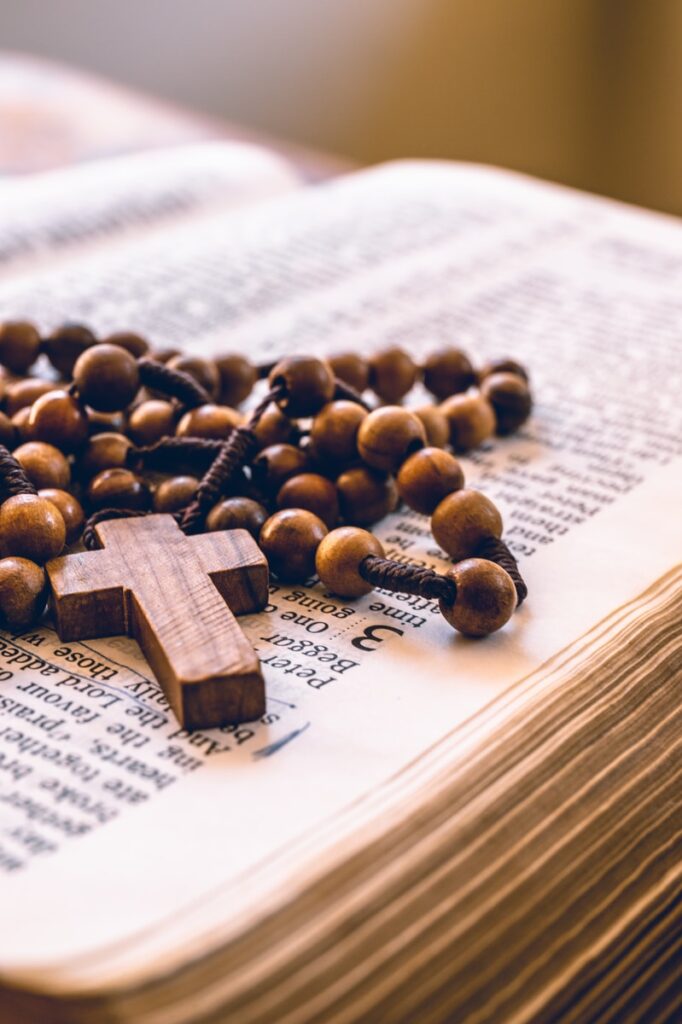
How to Pray the Rosary
If you would like to learn how to pray the Rosary, you can access a printable guide (Praying the Rosary.) Sometimes it is easier to learn how to pray by praying with someone.
The videos below are the four sets of Mysteries prayed by Archbishop Carlson and some of the Seminarians at the Rigali Center here in the Archdiocese of St. Louis.
Chaplet of Divine Mercy
We pray the Chaplet of Divine Mercy daily at 3:33pm in the Little Church. We would love for you to join us!
In 1935, St. Faustina Kowalska, a Polish nun, received a vision and inspirations to pray the prayers of this chaplet honoring the Divine Mercy of our Lord Jesus Christ. The Hour of Mercy starts at 3 pm, the same hour that Jesus died on the Cross, and so this chaplet is often prayed during that hour. The Chaplet of Divine Mercy is recited using ordinary Rosary beads of five decades. An explanation on how to pray this chaplet is found below and you can pray along with the video below as well.

Using a rosary make the sign of the Cross.
In the name of the Father, and of the Son, and of the Holy Spirit. Amen.
Optional Prayers
You expired, Jesus, but the source of life gushed forth for souls, and the ocean of mercy opened up for the whole world. O Fount of Life, unfathomable Divine Mercy, envelop the whole world and empty Yourself out upon us.
O Blood and Water, which gushed forth from the Heart of Jesus as a fount of mercy for us, I trust in You! (Repeat three times)
Introductory Prayers
Our Father, who art in heaven, hallowed be thy name. Thy kingdom come, thy will be done, on earth, as it is in Heaven. Give us this day our daily bread and forgive us our trespasses as we forgive those who trespass against us; and lead us not into temptation, but deliver us from evil. Amen.
Hail Mary, full of grace, the Lord is with thee. Blessed art thou among women, and blessed is the fruit of thy womb, Jesus. Holy Mary, Mother of God, pray for us sinners, now and at the hour of our death, Amen.
I believe in God, the Father almighty, Creator of heaven and earth, and in Jesus Christ, His only Son, our Lord, who was conceived by the Holy Spirit, born of the Virgin Mary, suffered under Pontius Pilate, was crucified, died and was buried; He descended into hell; on the third day He rose again from the dead; He ascended into heaven, and is seated at the right hand of God the Father almighty; from there He will come to judge the living and the dead. I believe in the Holy Spirit, the Holy Catholic Church, the communion of saints, the forgiveness of sins, the resurrection of the body, and life everlasting. Amen.
Prayed on large bead prior to each decade:
Eternal Father, I offer you the Body and Blood, Soul and Divinity of Your Dearly Beloved Son, Our Lord, Jesus Christ, in atonement for our sins and those of the whole world.
Prayed on 10 small beads of each decade:
For the sake of His sorrowful Passion, have mercy on us and on the whole world.
Prayed after all 5 decades of Chaplet are complete:
Holy God, Holy Mighty One, Holy Immortal One, have mercy on us and on the whole world. (Repeat three times)
Optional Concluding Prayer:
Eternal God, in whom mercy is endless and the treasury of compassion—inexhaustible, look kindly upon us and increase Your mercy in us, that in difficult moments we might not despair nor become despondent, but with great confidence submit ourselves to Your holy will, which is Love and Mercy itself.
Celebrations Honoring Mary and the Other Saints
We honor, but do not worship, Mary and the saints in heaven. They lived lives of virtue and holiness that are presented to us as examples for us to follow. They completed their journey and are now with God. However, we can still ask them for help. Just as we can ask other people here on earth to pray for us, we can ask people in heaven, the saints, to pray for us.
Here at Ascension we honor Mary with communal devotions under the title of Our Lady of Perpetual Help and ask her to help us on our journey. Our Lady of Perpetual Help devotions are on Tuesdays after the 8 am Mass in the Main Church. There are different prayers associated with this devotion and different parishes use different ones. At Ascension, we provide prayer cards to use for all those who wish to participate in this devotional practice.
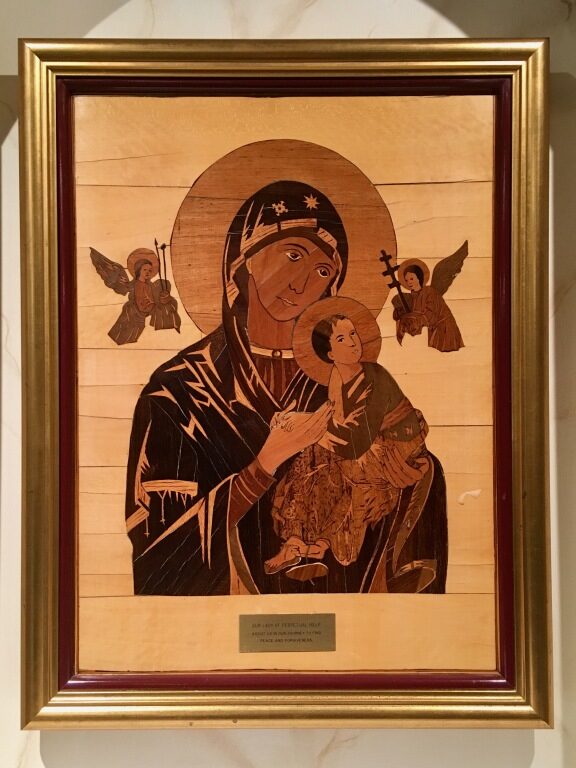
The Stations of the Cross
The Stations of the Cross are selections of particular moments at the end of Jesus Christ's life that help us to meditate on the passion, death and resurrection of Jesus Christ, so that we can better understand Jesus and His love for us. This devotion began as the practice of pious pilgrims to Jerusalem who would retrace the journey of Jesus Christ that won for us salvation. Over time, journeying with Jesus through His passion, death, and resurrection in Jerusalem became more difficult. Those who wished to make the journey but were unable to do so, would recall particular moments of that journey, while remaining in their church building, so that they could journey with Jesus spiritually rather than physically. The practice developed into the 14 stations (moments) currently found in almost every church, including our two churches.
All are invited to pray the Stations of the Cross privately in our churches using the numbered stations on the church walls. We pray the Stations of the Cross as a parish every Friday during Lent at 7 pm in the Main Church. Booklets with the Stations of the Cross and their prayers are provided for use when we pray them together.
There are many different prayers and meditations that are associated with the Stations of the Cross. However, there are two basic sets of stations. The first is the more traditional set of 14 stations, which developed from the middle ages and is attributed to St. Francis of Assisi, these are the stations commonly seen in churches. You can click the image below for a printable pamphlet with the traditional 14 stations. The second set was created by Pope St. John Paul II and is based more directly on scripture. You can also pray the stations of the Cross with our previous Associate Priest, Fr. Lampe, in the video.
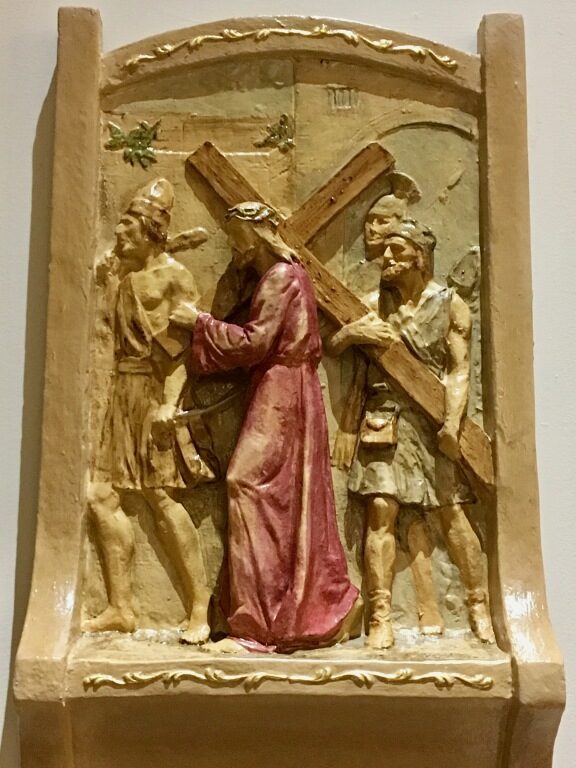
The Angelus
This prayer reminds us of the wonderful gift of the Incarnation. Quoting the Gospel of Luke, we recall St. Gabriel the Archangel appearing to Mary to reveal God's plan, Mary's humble acceptance of God's plan, and the Incarnation of the Son of God, Jesus Christ. This devotional prayer is traditionally prayed three times a day (6 am, noon, and 6 pm) and is accompanied by the ringing of the church bells. When the bells rang, all of the people who heard it, would stop whatever they were doing and pray this prayer. Here at Ascension we pray the Angelus at noon before Mass as our bells are ringing for the Angelus. The prayer is provided below, along with a video of the Angelus. When there is more than one person, the verses (V.) are prayed out loud by the leader and the responses (R.) are prayed by the others present. The Hail Mary is prayed by all.
V. The Angel of the Lord declared unto Mary.
R. And she conceived of the Holy Spirit.
Hail Mary, full of grace,
The Lord is with Thee;
Blessed art thou among women,
And blessed is the fruit of thy womb, Jesus.
Holy Mary, Mother of God,
Pray for us sinners,
Now and at the hour of our death. Amen
V. Behold the handmaid of the Lord.
R. Be it done unto me according to thy word.
Hail Mary, etc.
V. And the Word was made Flesh.
R. And dwelt among us.
Hail Mary, etc.
V. Pray for us, O holy Mother of God.
R. That we may be made worthy of the promises of Christ.
LET US PRAY
Pour forth, we beseech Thee, O Lord, Thy grace into our hearts, that we to whom the Incarnation of Christ Thy Son was made known by the message of an angel, may by His Passion and Cross be brought to the glory of His Resurrection. Through the same Christ Our Lord. Amen.
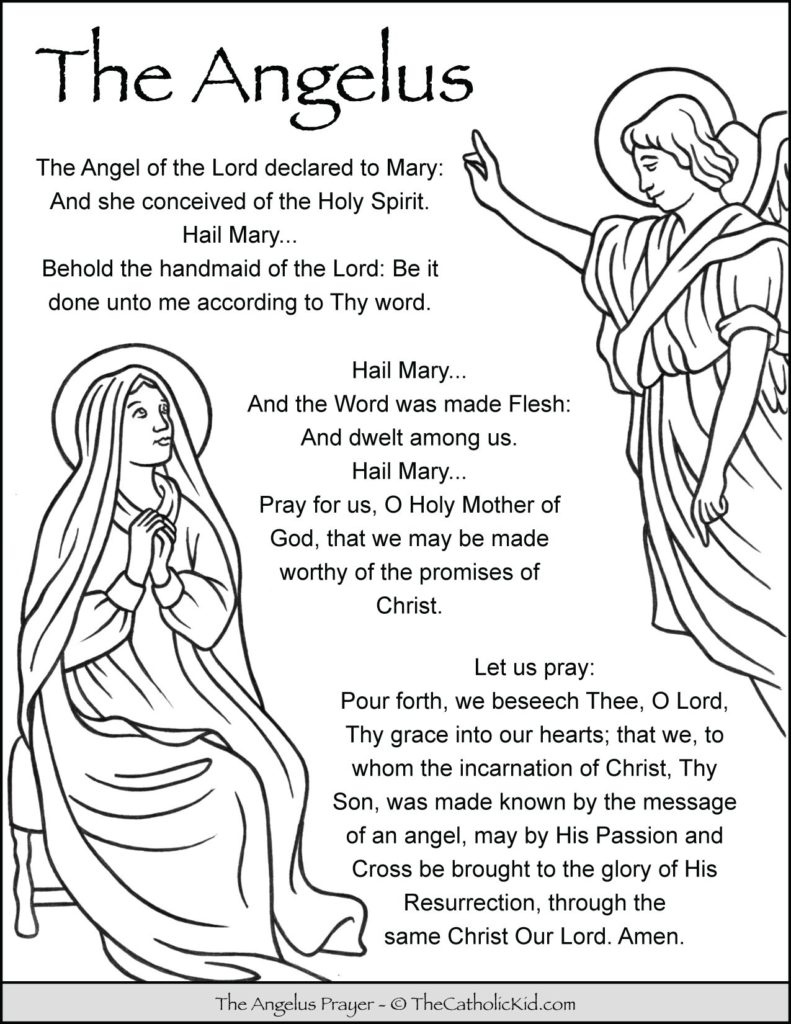
The St. Michael Prayer
The St. Michael prayer was written by Pope Leo XIII in 1886. The Pope, following Holy Mass, had a vision of the tremendous damage Satan would do to the Church and the world in the 20th century. Pope Leo XIII wrote this prayer in response to the vision and added it to the prayers to be recited after Masses without music. Although no longer required, the prayer is still encouraged. At Ascension, the St. Michael Prayer is prayed after every Mass that does not include music.
St. Michael the Archangel,
defend us in battle.
Be our defense against the wickedness and snares of the Devil.
May God rebuke him, we humbly pray,
and do thou,
O Prince of the heavenly hosts,
by the power of God,
cast into hell Satan,
and all the evil spirits,
who prowl about the world
seeking the ruin of souls. Amen.
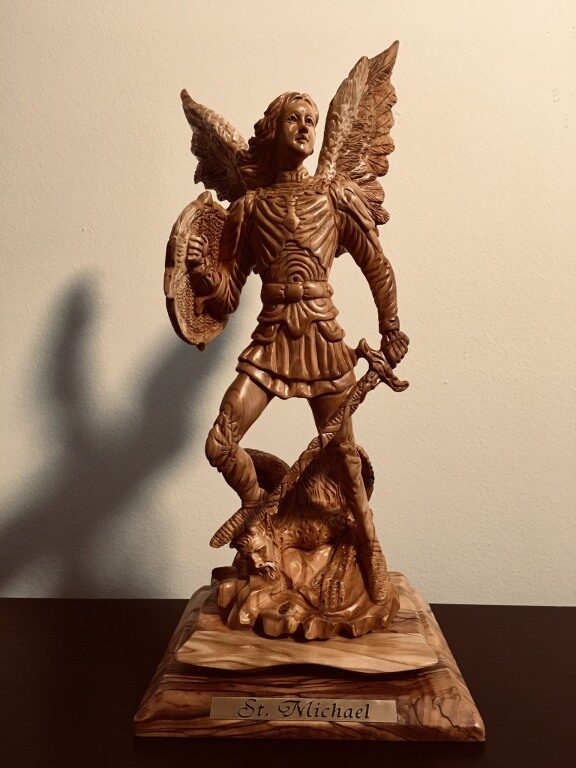
Chaplet of St. Michael
The Chaplet of St. Michael is a powerful way to call upon St. Michael the Archangel and the Nine Choirs of Angels. St. Michael appeared to a devout Servant of God, Antonia d’Astonac, and told her that he wished to be honored by nine salutations to the nine Choirs of Angels: Seraphim, Cherubim, Thrones, Dominations, Powers, Virtues, Principalities, Archangels and Angels (Isa. 6:2; Gen. 3:24; Col. 1:16; Eph. 1:21; Rom. 8:38). In return, St. Michael promised: "Whoever would practice this devotion in his honor would have, when approaching the Holy Table, an escort of nine angels chosen from each of the nine Choirs. In addition, for the daily recital of these nine salutations, he promised his continual assistance and that of all the holy angels during life, and after death deliverance from Purgatory for themselves and all their relations." The video below can help you pray this chaplet.
Make a Sincere Act of Contrition:
O my God, I am heartily sorry for having offended Thee, and I detest all my sins because of thy just punishments, but most of all because they offend Thee, my God, who art all good and deserving of all my love. I firmly resolve with the help of Thy grace to sin no more and to avoid the near occasion of sin. Amen.
V. O God, come to my assistance
R. O Lord, make haste to help me.
Glory be to the Father, etc.
1. By the intercession of St. Michael and the celestial Choir of Seraphim, may the Lord make us worthy to burn with the fire of perfect charity. Amen.
1 Our Father, 3 Hail Mary's
2. By the intercession of St. Michael and the celestial Choir of Cherubim, may the Lord vouchsafe to grant us grace to leave the ways of wickedness to run in the paths of Christian perfection. Amen.
1 Our Father, 3 Hail Mary 's
3. By the intercession of St. Michael and the celestial Choir of Thrones, may the Lord infuse into our hearts a true and sincere spirit of humility. Amen.
1 Our Father, 3 Hail Mary's
4. By the intercession of St. Michael and the celestial Choir of Dominions, may the Lord give us grace to govern our senses and subdue our unruly passions. Amen
1 Our Father, 3 Hail Mary's
5. By the intercession of St. Michael and the celestial Choir of Powers, may the Lord vouchsafe to protect our souls against the snares and temptations of the devil. Amen.
1 Our Father, 3 Hail Mary's
6. By the intercession of St. Michael and the celestial Choir of Virtues, may the Lord preserve us from evil and suffer us not to fall into temptation. Amen.
1 Our Father, 3 Hail Mary's
7. By the intercession of St. Michael and the celestial Choir of Principalities, may God fill our souls with a true spirit of obedience.
1 Our Father, 3 Hail Mary's
8. By the intercession of St. Michael and the celestial Choir of Archangels, may the Lord give us perseverance in faith and in all good works, in order that we gain the glory of Paradise. Amen.
1 Our Father, 3 Hail Mary's
9. By the intercession of St. Michael and the celestial Choir of Angels, may the Lord grant us to be protected by them in this mortal life and conducted hereafter to eternal glory. Amen.
1 Our Father, 3 Hail Mary's
1 Our Father In honor of St. Michael.
1 Our Father In honor of St. Gabriel.
1 Our Father In honor of St. Raphael.
1 Our Father In honor of our Guardian Angel.
O glorious Prince St. Michael, chief and commander of the heavenly hosts, guardian of souls, vanquisher of rebel spirits, servant in the house of the Divine King, and our admirable conductor, thou who dost shine with excellence and superhuman virtue, vouchsafe to deliver us from all evil, who turn to thee with confidence, and enable us by thy gracious protection to serve God more and more faithfully every day.
V. Pray for us, O glorious St. Michael, Prince of the Church of Jesus Christ
R. That we may be made worthy of His promises.
Almighty and Everlasting God, who by a prodigy of goodness and a merciful desire for the salvation of all men, hast appointed the most glorious Archangel, St. Michael, Prince of Thy Church, make us worthy, we beseech Thee, to be delivered from all our enemies that none of them may harass us at the hour of death, but that we may be conducted by him into the august presence of Thy Divine Majesty. This we beg through the merits of Jesus Christ, our Lord. Amen.
